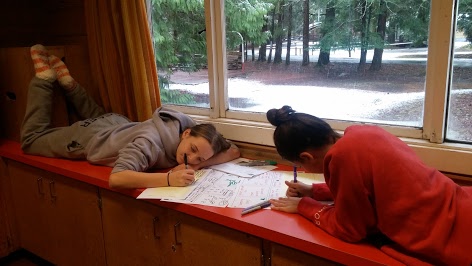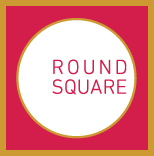Collingwood’s Leadership Institute
Posted: 12 February 2019

A Round Square Conference for 12 to 14-year-olds inspired staff at Collingwood to look at how they develop leadership skills in their Round Square volunteers. Round Square Rep, Katie Field, and the Director of Student Life, Sam Weiss, developed a weekend workshop to examine the topic of leadership in more depth with the aim of emboldening students to collaboratively drive Round Square initiatives in the school. The workshop focused on improving students’ confidence, developing awareness of their leadership style, and building an appreciation for different ways of working. Subsequent workshops, led by Jacqui Johnson, extended this idea to younger students and incorporated the Future Design School model.
Authors: Katie Field, Science Teacher; Jacqui Johnson, Learning Commons Coordinator and Math 7 Teacher
Planning
An off-campus weekend workshop was felt to be the best way of encouraging students to think differently. Away from the distraction of day-to-day school life, they had the headspace to explore themes in depth. The national park location provided opportunities for experiential activities, increasing the likelihood that the students’ learnings would be absorbed long-term. The adventurous aspect of the weekend also appealed to parents and helped secure funding from the parent council.
The first workshop involved Round Square volunteers in Grades 8 and 9, but in subsequent years, it has been extended to students in Grade 7 as part of their preparation for entry to the Senior School.
Activity
In the first iteration of the workshop, with slightly older students, the weekend began with a series of games to encourage the students to consider the subject of leadership and expose them to different leadership types and styles.
Using a personality survey, students identified their leadership type linked to a colour. For example, a ‘Red Leader’ is strong-willed and purposeful, a “yellow” is enthusiastic and persuasive, a “blue” is precise and deliberate, and a “green” is encouraging and sharing. Through this process, students gained an appreciation of different leadership types, recognising that each style has strengths and potential weaknesses. The process also helped dispel some of the myths around leadership, for example, that only a certain type of person can take a leadership role.
The workshop also included a number of practical elements, which varied the format for students, and allowed them to learn more about leadership through first-hand experiences. Working in teams, students were tasked with crossing a river. Each time they did, they were introduced to a new rule: practical ones (they can’t touch the bank), team-based ones (they must cross as a team at the same time) or something that challenges the team dynamic (for example, the leader cannot speak). Through these different challenges, they learned more about how a successful group functions and the barriers that might inhibit a group’s success.
The workshop concluded with students selecting the Round Square activities they would like to lead on upon returning to school. The initiatives that have resulted from this include various collections as well as Diversity Days.
The Leadership Institute has since evolved to meet the school’s needs at the time. Rep, Jacqui Johnson, saw an opportunity to link the workshop with an initiative championed by the Independent Association of Schools in Canada.
Four students were selected to join a retreat on the subject of leadership and bring their learnings back to the school. Then using the Future Design School Model, they examined how they could apply their new-found leadership skills to effect positive change in the school. As the model prescribes, the students began by taking a look at all school matters and considering if there are any ‘deficiencies’. They concluded that our school could do more to promote inclusivity and diversity.
The nominated students were tasked with amassing a group of volunteer students to examine the problem and collaborate to find a solution. Their chosen project team then attended the Leadership Institute weekend workshop.
After an introduction to the Future Design School approach, students took part in a ‘Noticing Bias’ Activity to help students understand themselves, their own biases, strengths and feelings.
They then participated in a team building activity. One particular exercise that the students enjoyed was the Blindfold Test. Students were taken to a national park (an area that is unfamiliar, with a varied environment and potential hazards) and blindfolded. Whilst blindfolded, they navigated a rope-guided course with hills, holes, even bugs in the way – and tried to keep their composure! The person at the front of the group acted as the leader and had to use their communication skills to guide the students along the course. At the end, they reflected on how they performed – what they think worked well and was helpful, and how they might improve.
On returning, they were prompted to explore the definition of leadership by examining leadership models from business and government. Students then developed a definition of leadership.
Before some periods of reflection and further outside activities, they participated in an Empathize Session. In order for students to design an effective solution, they had to first understand the needs of their users. In this case, users could be a variety of people: New Canadians, Indigenous People, people who identify as LGBTQ and their fellow students.
After some warm-up activities, the second day began with an Ideation Session. Students discussed what they learned the day before in the empathy session, and then developed eight great ideas to bring back to their school. Next, they narrowed down those ideas and chose three to share with the rest of their group through user storyboards.
A structured critique session followed, allowing students to provide each other with feedback on their initial ideas. This then flowed into a session on iteration, explaining to students how they could use the feedback from their peers and understanding of various audiences to develop a second iteration of their solution.
Students were encouraged to think through the practicalities of their proposal by developing a “process map” outlining their solution and showing how it could be implemented in the school. Part of their planning involved predicting what challenges they might encounter when trying to implement their projects and brainstorming approaches for overcoming those challenges.
Finally, students presented their ideas to their groups, effectively rehearsing the pitch they would deliver to their school community when returning to school. A concluding analysis activity invited students to consider how they would bring their own learning back to other students in the school.
Challenges
As a Day school, it is hard to find time in the school day for activities considered beyond the curriculum. Holding the activity on the weekend helped circumvent that but also ensured that students were fully immersed in the topic without other school distractions.
Impact
The students have benefited from this Leadership Institute by gaining leadership skills, confidence and the knowledge of how to create change in our school. The school has benefited directly from this Leadership Institute because our Round Square group has implemented programs that have been developed at this Institute, such as Diversity Days. The school also benefits indirectly as these students take on leadership roles over their time at the school; they continuously use the leadership skills they gained from this experience.
The program has been celebrated in the school mostly through our larger Round Square clubs on campus where we highlight the experiences of the students.
The future
In the future, the school co-ordinators hope to use the Discovery Framework as a reflection tool at the end of the Institute weekend.
Advice
- Take time out and away from school – The students are more relaxed and therefore better able to challenge their thinking and absorb the learnings.
- Schedule the weekend early! To ensure maximum take-up from students and secure your chosen staff co-ordinators. Your staff should be enthused about Round Square and supportive of student leadership.
- Think about the follow-up – Having learned about leadership, make sure there are opportunities after your event to help students put theory into practice.
